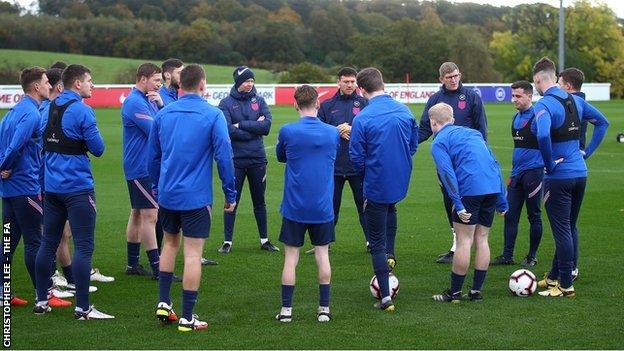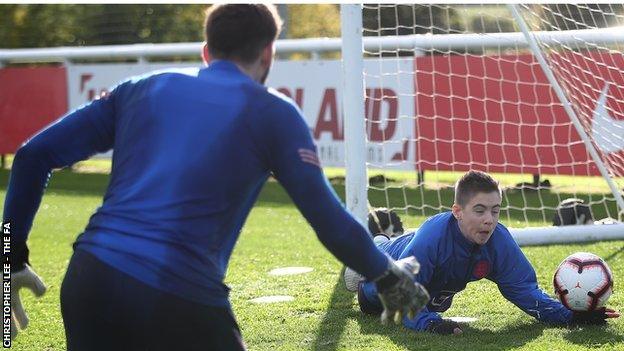Cerebral palsy football: England senior team leading a new age of disability football
- Published

England CP coach Andy Smith (fourth from right) gives instructions to his team
England's senior cerebral palsy team have "closed the gap" on the world's best sides and now "have to start winning medals" as they head towards the 2022 World Cup.
Coach Andy Smith's England CP squad have been training at the St George's Park national football centre, and Smith says that alongside great facilities they need to create a "winning mentality" to prepare for April's event in Barcelona.
Last month, the English Football Association launched its three-year 'Football Your Way' plan to grow and develop disability football. Smith says his squad "are made to feel like international players" as part of the national set-up "and they have to remember they are role models".
CP football is a seven-a-side sport with smaller goals, 30-minute halves and no offside. Players are classed as FT1, FT2 and FT3 depending on how their disability affects them, with at least one FT1 player and a maximum of one FT3 player required at all times. An FT3 player is less impacted by their disability.
Smith and his team usually meet one weekend each month, with members of the squad, including captain Matt Crossen, playing 11-a-side football in their own time. However, their schedule has been decimated by the Covid-19 pandemic.
Longer term, Smith hopes the FA's new initiative will spread word of the pathway for young footballers, growing the talent pool for senior and development squads across the Para-football spectrum, including the CP, powerchair, deaf, partially sighted and blind England sides, all of which he oversees as head of Para-football operations.
Goalkeeper Rhys Porter, 13, trains with the England CP team after social media abuse
'My name is on the cap wall at St George's Park'
England finished fourth out of 16 in their past two tournaments, with Smith naming Ukraine, Brazil and Russia as the best teams in the world, despite sitting below England in the rankings.
Smith's challenge is to improve the different impairment teams under his remit.
"We want a collective winning strategy. In the next three years, we want every team to be challenging at tournaments," he said.
"We have a great talent pathway that leads to the under-21s and then the senior sides. We haven't known what is out there.
"The awareness of it is already better, the opportunities are growing and the coaches we've got here are brilliant. With the senior players especially, we train them like footballers, not CP footballers.
"With the facilities, the kit, how we prepare, how we travel when we go to tournaments, these guys are made to feel like international players and they have to remember they are role models."
Giles Moore, England CP goalkeeper, said: "We are all treated the same. We've got a cap wall here at St George's Park for all the players with over 50, 100 and 150 caps - and my name is on it."
Some of England's World Cup rivals, such as Russia and Ukraine, are employed directly by their governments and train more regularly, while changes to the classification rules in 2018, external on the degree of impairment meant some of Smith's key men were no longer eligible to play CP football.
Goalkeeper Moore added: "When I started in 2013, we were losing 8-0 to Ukraine and Russia, and now we are getting draws, and we are knocking on the door of the bigger teams. Our aim is to win a medal and the staffing is there to get us to the top level.
"The standard is so high now. Yes, we've all got disabilities, but if you weren't familiar with the sport and you watched us train, you wouldn't know."

Rhys Porter joins in with England CP training at St George's Park
'You can make it here if you work hard'
Rhys Porter, the 13-year-old goalkeeper with cerebral palsy and epilepsy who raised money for a disability charity after receiving social media abuse, was invited to train with the CP team. He has begun playing powerchair football, and says being at St George's Park changed his perception of what he can achieve.
"Anyone can take themselves anywhere if they put their mind to it," he told BBC Sport. "I've just moved on from my pan-disability team, where I've played since I was four.
"I didn't know you could play for England. It inspires me to know that you can make it here if you work hard.
"I've always wanted the same opportunities for everyone and it is great that the FA are pushing us towards that."

'This is the hardest thing I've ever done': Can Robbie Savage turn Macclesfield F.C into a club the community can be proud of?
Finders keepers, right?: A community payback sentence soon becomes far more complicated
